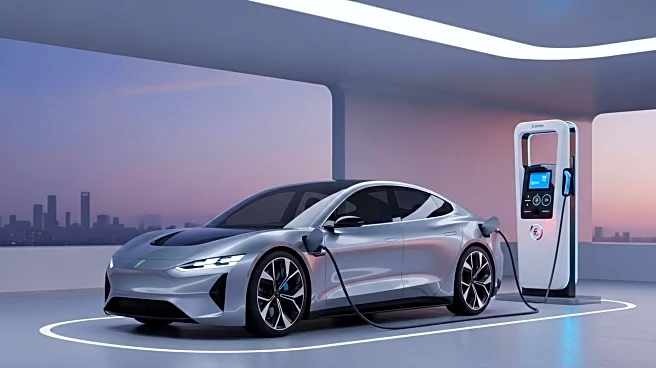What's Happening?
BYD, a Chinese car manufacturer, has announced its ambition to surpass Tesla in the U.K. electric vehicle market following a significant increase in sales. In September, BYD sold 11,271 vehicles in the U.K., a substantial rise from 1,150 units sold in the same month last year. This surge has elevated BYD's market share to 3.6%, positioning it as the second-largest EV seller in the U.K., trailing only Tesla. Despite this growth, BYD's shares fell by over 3%. The company plans to introduce its ultrafast charging technology to the U.K. and other parts of Europe next year, aiming to become the leading EV and plug-in hybrid vehicle manufacturer in the region.
Why It's Important?
BYD's aggressive expansion in the U.K. market highlights the growing competition in the global EV industry, particularly against established players like Tesla. The company's success in the U.K., its largest market outside China, underscores the increasing demand for affordable and technologically advanced EVs. This development could influence market dynamics, potentially leading to more competitive pricing and innovation in EV technology. The exclusion of Chinese-made cars from the U.K. government's subsidy scheme due to environmental concerns also raises questions about the sustainability of manufacturing practices in the EV sector.
What's Next?
BYD's future plans include the introduction of ultrafast charging technology in Europe, which could further enhance its competitive edge. The company's continued growth in the U.K. and Europe may prompt responses from other major EV manufacturers, potentially leading to strategic shifts in market approaches. Additionally, the ongoing exclusion from subsidy schemes may push BYD to adopt more environmentally friendly manufacturing practices to align with global sustainability standards.
Beyond the Headlines
The rise of BYD in the U.K. market reflects broader trends in the global automotive industry, where Chinese manufacturers are increasingly challenging Western dominance. This shift could lead to significant changes in trade policies and international relations, particularly concerning environmental standards and market access. The success of BYD also highlights the importance of technological innovation and strategic market positioning in the rapidly evolving EV landscape.










